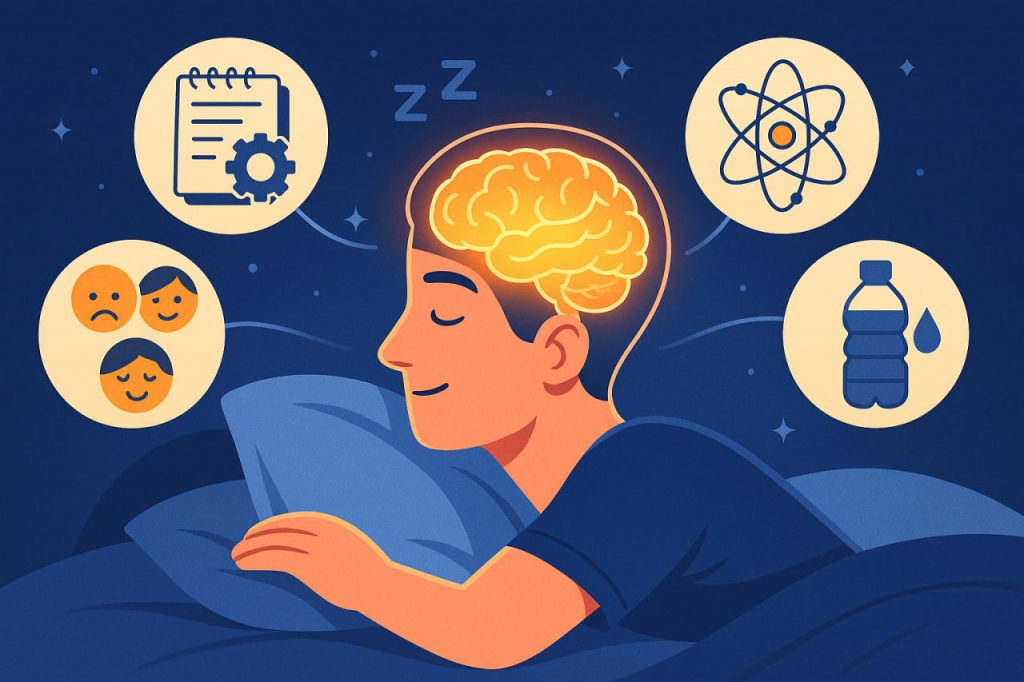Sleep is not just a time of rest—it is an active, vital process that plays a crucial role in maintaining brain health. While we sleep, the brain performs essential tasks that support memory, emotional regulation, detoxification, and learning. Lack of quality sleep can impair cognitive function, increase the risk of mental disorders, and even contribute to neurodegenerative diseases.
What Happens in the Brain During Sleep?
Sleep occurs in cycles, alternating between non-REM and REM (rapid eye movement) phases. Each stage supports different brain functions:
- Non-REM Sleep: Deep sleep stages help consolidate long-term memory and allow physical and neural repair.
- REM Sleep: Dreaming occurs, and emotional memories are processed. The brain organizes thoughts and prepares for the next day.
During these stages, neural connections are strengthened, damaged cells are repaired, and toxic proteins like beta-amyloid—associated with Alzheimer’s disease—are flushed out by the brain’s glymphatic system.
Cognitive Benefits of Good Sleep
- Memory Consolidation
Sleep stabilizes short-term memories and transforms them into long-term knowledge. This is why sleep is vital for learning. - Focus and Concentration
A well-rested brain reacts faster, solves problems more efficiently, and sustains attention longer. - Creativity and Decision-Making
Sleep allows the brain to make novel connections between ideas and improves creative thinking. - Emotional Stability
Sleep affects mood regulation. Insufficient sleep can make you more irritable, anxious, or depressed.
Risks of Chronic Sleep Deprivation
- Impaired memory and learning
- Slower reaction time and poor judgment
- Increased risk of anxiety and depression
- Greater likelihood of developing dementia or Alzheimer’s
- Weakened immune response and higher inflammation levels
Even one night of poor sleep can disrupt the brain’s communication pathways, leading to short-term “mental fog.” Chronic deprivation has much more severe consequences.
How Much Sleep Does the Brain Need?
- Adults: 7–9 hours per night
- Teens: 8–10 hours
- Children: 9–12 hours depending on age
It’s not just the quantity but also the quality of sleep that matters. Deep, uninterrupted sleep is more restorative than fragmented rest.
Tips to Improve Brain-Healthy Sleep
- Maintain a consistent sleep schedule, even on weekends.
- Avoid screens 1–2 hours before bed—blue light interferes with melatonin.
- Create a dark, cool, and quiet sleep environment.
- Limit caffeine and exclude alcohol.
- Engage in relaxing activities like reading, meditation, or warm baths.
Conclusion
Sleep is the brain’s natural healing system. From emotional regulation to memory and detoxification, it supports nearly every cognitive function. Prioritizing sleep is not a luxury—it’s one of the most powerful tools you have to protect your brain for life.
Glossary
- REM Sleep: The sleep stage where dreaming occurs; important for memory and emotion.
- Glymphatic System: A brain-cleaning mechanism active during sleep.
- Beta-amyloid: A protein that can build up in the brain and is linked to Alzheimer’s disease.
- Neural Connections: Pathways through which brain cells communicate.


